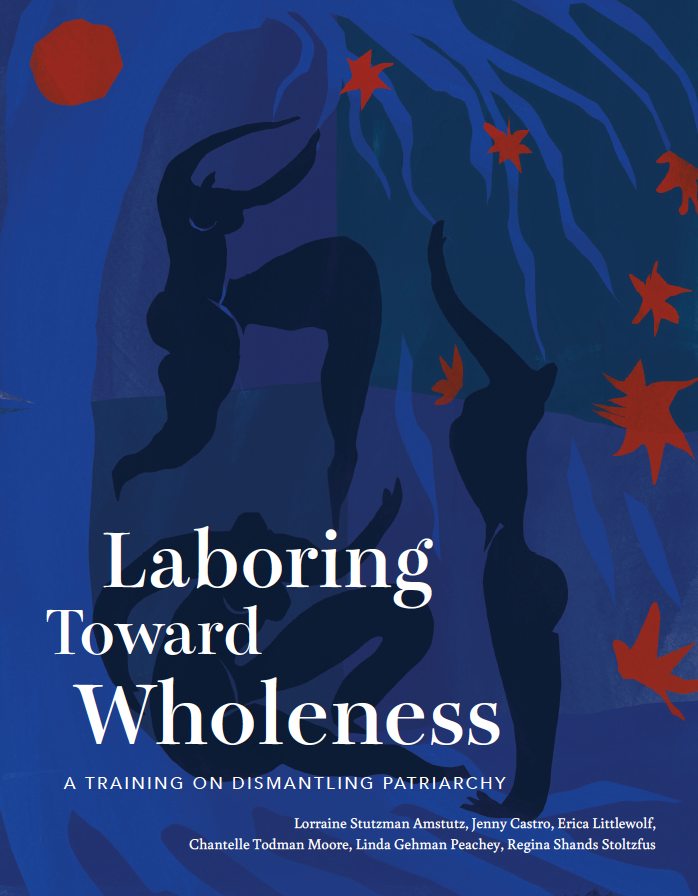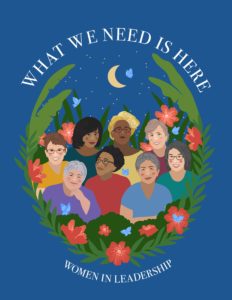 In 2020, the Mennonite Church USA Women in Leadership (WIL) created the Laboring Toward Wholeness curriculum as a training on dismantling patriarchy. Among the WIL writers were Linda Gehman Peachey and Sue Park-Hur. During winter and spring 2022, Linda and Sue led a group of participants, including Amy Zimbelman, Beth Landis, Christie Dahlin, Kathy Bilderback, Marilyn Bender, Marilyn Parrish, Pam Oliason, Pam Piper-Ruth and Rebecca Weybright, in a nine-week training on the curriculum. Below is a reflection of the time this group spent together.
In 2020, the Mennonite Church USA Women in Leadership (WIL) created the Laboring Toward Wholeness curriculum as a training on dismantling patriarchy. Among the WIL writers were Linda Gehman Peachey and Sue Park-Hur. During winter and spring 2022, Linda and Sue led a group of participants, including Amy Zimbelman, Beth Landis, Christie Dahlin, Kathy Bilderback, Marilyn Bender, Marilyn Parrish, Pam Oliason, Pam Piper-Ruth and Rebecca Weybright, in a nine-week training on the curriculum. Below is a reflection of the time this group spent together.
__________________
“But what about the women?” The question seemed so obvious, so important to ask in this group of committed student peacemakers. They had just been told that a prominent peace theologian had been invited to their campus, despite being under discipline for sexual misconduct. The question just tumbled out. What the speaker was not expecting was the anger directed back at her. How dare she? How dare she bring up the needs of women, when this was such a wonderful opportunity to meet this famous voice for peace? The experience left her stunned and shaken.
Sadly, this was not the only difficult experience we shared, as the twelve of us worked through the Laboring Toward Wholeness curriculum over the course of nine weeks this winter and spring. Led by Sue Park-Hur and Linda Gehman Peachey from MC USA Women in Leadership, we met weekly via Zoom from across the country, representing Pacific Southwest, Pacific Northwest, Mountain States and Atlantic Coast Conferences. We experimented with a new way to use this curriculum for dismantling patriarchy and working toward more wholeness in our world.
Together, we created a supportive space in which to wrestle with our understanding of patriarchy and how it functions. We learned more about how its roots intertwine with capitalism, colonialism and white supremacy, and thus, it manifests itself in unique ways in different communities. We studied how our Western culture has been built on binaries, with white men often identified with a transcendent, divine spirit, while women and people of color are associated with the earth, which is deemed inferior and expendable. We examined biblical texts that appear to support patriarchy, as well as those that push against it. We also explored how people throughout history have resisted patriarchy and the harms it causes, as well as more steps each of us can take to dismantle these oppressive systems.
Throughout, we struggled to understand more deeply that central question of why it is so hard to pay attention to women and their welfare.
Why have we so often been silenced, bullied and demeaned? Why have we so often had to hide ourselves or make ourselves smaller? Why is so much attention given to how we look and what we wear? What has this done to us? To everyone? How has this affected our bodies, our spirits, our relationships, our understanding of God? And what can we do, now, to work toward more health and wholeness for ourselves and our communities?
Of course, we did not solve all these questions. But it was wonderful to know that we are not alone. We have companions on this journey and we can create treasured spaces where we can share deeply and without fear. We can learn to read Scripture from new perspectives and find resources there for encountering the loving, liberating God, who is revealed to us in Jesus. We can also role play healthy responses to humiliating and offensive comments and engage in life-giving spiritual practices.
In the end, we all felt privileged to have been part of this group and heartily recommend these materials to others. This curriculum provides powerful resources for better understanding patriarchy, as well as useful guides for exploring difficult questions and gaining more tools for addressing it in our congregations and society. We hope you find it as enriching and encouraging as we did. May we all work together to build safer, more respectful communities.

MC USA’s Women in Leadership (WIL) works to dismantle patriarchal systems in Mennonite Church USA by empowering women to live out the call of God on their lives, increase their capacities, and contribute their wisdom in congregations, area conferences, agencies and institutions.

